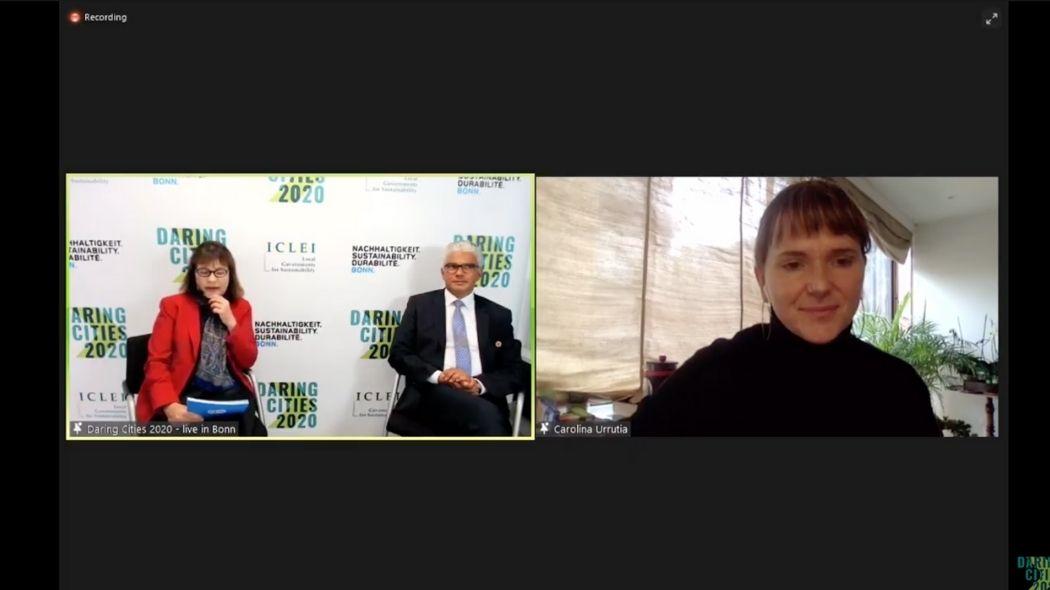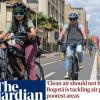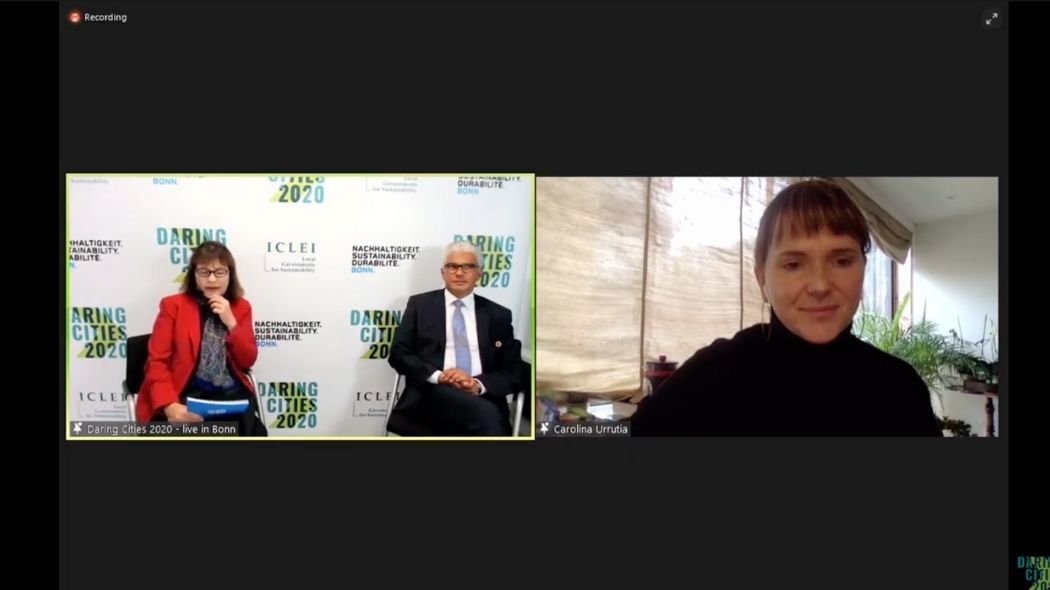During the opening session of Daring Cities 2020, the panelists from different parts of the world agreed that the coronavirus pandemic brought lessons that have contributed to creating a sense of international community, which can also be applied to face the climate crisis.
The District Secretary for the Environment Carolina Urrutia, was the panelist representing Bogotá at the annual event Daring cities, a global virtual forum in which urban leaders, representatives of national governments and decision makers of civil society propose and share solutions on how to face the climate emergency. In this year's edition, the focus is on the new challenges added by COVID-19.
En este momento la secertaria @Colinita participá en el dialogo multilevel con autoridades ambientales de todo el mundo dentro de la apertura de @daringcities#DaringCities2020pic.twitter.com/xuqzy9R0WD
— Relaciones Internacionales Bogotá (@BogotaInter_nal) October 7, 2020
This activity was designed and organized by ICLEI and the City of Bonn. ICLEI - Local Governments for Sustainability – is a global network of more than 1,750 governments committed to sustainable urban development. Its activities drive local actions for low-emission development, based on nature, equitable and in favor of creating a systemic change for urban sustainability.
The opening speech of the event was given by Ashok Sridharan, Mayor of Bonn and President of ICLEI, the message was based on the importance of the commitments that we must all have in the fight to mitigate climate change. Following his intervention, Antonio Guterres, Secretary General of the United Nations addressed the leaders and decision-makers regarding the importance of continuing to implement measures to reduce the consequences of climate change, and also to attack COVID -19 "leaving no one behind."
Svenja Schulze, the German Minister for the Environment, Nature Conservation and Nuclear Safety, highlighted how cities are at the same time vulnerable to the effects of global warming, since they are responsible for 75% of CO2 emissions; But they also have the best opportunity to fight it, because around 85% of world GDP is concentrated in cities.
Norbert Barthle, Germany's federal minister for economic cooperation and development, spoke about the future of cities. “Cities are the main producer of greenhouse gases and humanity is going through an immense process of urbanization, especially in Africa and in Asia, for this reason, compliance with the Paris agreements must necessarily be done ”.
Patricia Espinoza, UN Executive Secretary for Climate Change, pointed to recent fires and natural emergencies as proof that climate change is real and stronger than ever. She emphasized the role of renewable energies and how they can transform the lives of thousands of people by improving their living conditions, “It is difficult to suddenly make the leap towards clean energies in a transition that is based on adjustments, but it is essential that all nations have access to the technologies that allow it ” she said.
The climate battle will be won or lost in our urban centers. And local governments have a central role to play in building cleaner, greener, more climate-friendly and sustainable cities. @PEspinosaC at #DaringCities forum. pic.twitter.com/4IcUYYaSSv
— UN Climate Change (@UNFCCC) October 7, 2020
Arvind Kejriwal, Chief Minister of the City of Delhi, noted how the COVID-19 lockdown experience greatly improves air quality and how it helped citizens better understand that reducing pollution was possible through Individual actions with collective results, “during the winter and thanks to the bad weather, Delhi becomes a gas chamber for which we had to take actions that were not very well received, reduction in traffic, fines to polluting industries; They called them a political suicide, but little by little the common people have realized that they have to participate, and I share this because although the measures we applied were at the local level, they are replicable and the leaders owe them to the people, it is our debt ”.
"While the whole world is grappling with the pandemic, Coronavirus made us aware of the fact that human beings are responsible for tampering with the climate as the quality of air has improved since the lockdown." - says Delhi CM, @ArvindKejriwal@daringcities#DaringCitiespic.twitter.com/FZOzjbJPyf
— ICLEI South Asia (@ICLEISouthAsia) October 7, 2020
For his part, the Mayor of Uganda Vincent Kanjaya emphasizes that COVID-19 and its global impacts are a time when good ideas should be shared and imitated "these difficult times generate momentum that will lead to more action."
Financing is essential for municipalities to take #climateaction says Mayor @paul_kayanja of Entebbe Municipality at #DaringCities.
— ICLEI Africa (@ICLEIAfrica) October 7, 2020
We’ll be finding solutions for unlocking #climatefinance in #Africancities in Nov. #LOCS4AFRICAhttps://t.co/Ugu1xVIuPopic.twitter.com/RZC8N0H936
US Senator Kevin de León, representative for the state of California, agreed with Mayor Kanjaya, adding that "extraordinary times require extraordinary measures," and urged local leaders "not to wait for measures or decisions from central governments, and to do on their own what is best for humanity ”.
In Bogotá´s turn, the Secretary of the Environment Carolina Urrutia intervened. She highlighted the systemic structure of the climate crisis in the case of the capital, “Bogotá is not an island and we depend on an entire region. That is why our mayor made an effort with the municipalities around Bogotá in terms of creating a more equitable and sustainable city, “cities can be true engines of transformation if they take into account their place in the chain of consumption and production, for example, In our case, with the Metropolitan Region strategy we are taking measures for cleaner agriculture and a more responsible use of soils ”.
In this multilevel and multicultural meeting between Bogotá, India, Brazil, Uganda, USA and Germany, all reached the common conclusion that to mitigate climate change it is necessary first of all, that the population is committed. On the other hand, the task of government leaders and entities is to encourage this purpose in society. As stressed by the Secretary of the Environment, Carolina Urrutia, "the collective experience with COVID-19 is a great lesson that we can apply to act together and face climate change."







